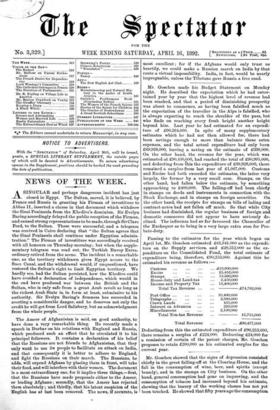Mr. Goschen made his Budget Statement on Monday night. He
described the expectation which he had enter- tained year by year that the highest level of revenue had been reached, and that a period of diminishing prosperity was about to commence, as having been falsified much as the expectation of the traveller in the Alps is falsified, who is always expecting to reach the shoulder of the pass, but who finds on reaching every fresh height another height beyond him. Last year he had estimated for an expendi- ture of £90,264,000. In spite of many supplementary estimates which he had not then allowed for, there had been savings enough to more than balance these extra expenses, and the total actual expenditure had only been £89,928,000, leaving a saving on the estimate of £336,000. On the other hand, the revenue for the year, which was estimated at £90,130,000, had reached the total of £90,995,000, and deducting from this the expenditure of £89,928,000, there remained a surplus from last year of 21,067,000. Customs and Excise had both exceeded the estimates, the latter very largely, the former by a very small sum. Stamps, on the other hand, had fallen below the estimate, by something approaching to £400,000. The falling-off had been chiefly in stamps on deeds and instruments in connection with the Stock Exchange, and in stamps on foreign securities. On the other hand, the receipts for stamps on bills of lading and contract-notes had not fallen off much. So that while City business had diminished, the regular business of foreign and domestic commerce did not appear to have seriously de- clined. The influenza had so far favoured the Chancellor of the Exchequer as to bring in a very large extra sum for Pro- bate-duty.
































